When it comes to health, digestion is often overlooked. But good digestion is the key to health! How well you digest has a huge effect on how healthy you are overall. From bloating, heartburn, sluggishness, fatigue, skin issues and more – these ailments could be attributed to a dysfunction in your digestive tract.
Here we discuss what causes digestive problems, and how to improve digestive health so you can cure and avoid chronic diseases.
Look around and you will see that the developing world is moving away from the rural areas and into the cities. In fact, by the time 2050 rolls by, 70% of the human population will be living in cities. What does this have to do with how to improve digestive health?
Well, with the move away from rural life, fresh air, healthy organic food, and outdoor activities, the norm for the urban lifestyle is an unhealthy Western style of eating.
Processed Diet = Chronic Diseases

Today, more than half of America’s people eat “ultra-processed foods,” relying on the Western diet.
What’s the Western diet?
It consists of plenty of GMO processed foods, added fat, meat, added sugar and refined grains.
And it's the Western diet that causes Western diseases. Imbalances like Type 2 diabetes, obesity, cardiovascular disease, and cancer.
In his writings, Michael Pollan writes all about the places where culture and nature intersect… On our plates, in our gardens, on our farms, and in our minds.
It was he who said we should “eat food, not too much, mostly plants,” – unfortunately his advice is not too often followed. But the tide is turning and people are waking up to the benefits of a plant-based diet.
Unfortunately, you get very little nutritional value eating processed foods. It's just a lot of empty calories. Obesity is soaring, and in 2014, there were more than 600 million obese adults. And the World Health Organization claims there's another 2 billion overweight.
Obesity Makes You Susceptible to Disease
When you are obese, your body falls prey to inflammation. This puts you at risk for horrible diseases like cancer and stroke, arthritis, heart disease, and the like.
Have you noticed how many people today need joint replacement surgery? It is because of the extra pressure and wear and tear on the joints and it’s happening to younger people too.
Also linked to obesity is diabetes, which affected over 374 million people back in 2014, and is on the rise.
What about cancer? Men who consume a Western diet are at high risk of dying from prostate cancer – which is linked to colon cancer – which is linked to inflammation and bad gut bacteria.
High processed, refined foods throw the whole immune system out of sync. The culprits are foods like palmitic acid and fructose. You can find these ingredients in sweets, which then start an immune reaction in your body.
It is only when you change your diet and digestive health that you will be able to restore your immune system.
What Causes Digestive Health Problems?

1. Not Eating Enough Vegetables and Fruit
You might remember your mother telling you to eat your fruit and vegetables. She was correct. Fruit and vegetables contain so many nutrients that your body needs. This includes carbohydrates, proteins, vitamins, fats, enzymes, and minerals.
Even though people know fruit and vegetables are nourishing, they still don’t eat them enough. This is because food companies make more money on foods that contain sugar, wheat, dairy, and meat. And then to add insult to injury, they market them as beneficial to your health. Nothing could be further from the truth!
Processed foods are high in sugar, salt, and fat. They make us fat, slow, lazy, lethargic, and susceptible to diseases.
The most popular vegetable is probably the potato because it's made into French Fries. Tomatoes, lettuce, and onion come close behind.
2. Not Eating Foods that Contain Enzymes
Raw foods and fermented type foods contain enzymes. Enzymes are very vital for the body, particularly digestion. If you eat mostly cooked food, You're most likely not getting any enzymes in your diet. This is because cooking kills enzymes, even more so in the processed and fast food businesses.

3. Drinking Beverages High in Sugar
The worst offenders are probably sugary fruit drinks and sodas. And much of these offenders are sold with the word “healthy” on them.
Naturally, we all love food and it’s a pleasure to enjoy. It is not that you should cut out sugar entirely; although you should if you have any health problems. But apart from that, moderation in everything is the key.
4. Eating Processed Foods
5. Eating Industrialized Animal Products

Even though animal products are part of our traditional diet, there are issues with animal products that form part of the Western diet
Some experts say cheese, milk, and yogurt can be healthy in moderation. But sadly, these foods come from animals fed and raised industrially, so know what your buying.
This means that products that you believe are healthy, are actually not.
They come from sick animals that ingest antibiotics, pesticides, and hormones. Plus they're fed food unnatural to them; grains!
If you want to avoid health problems, you need to start to reduce your intake of processed animal products. If your cheese, eggs, yogurt, and meat come from organically pasture-fed animals, then eating them in small amounts is okay, especially in colder months.
If you have an interest in going Dairy Free – Here's the Ultimate Guide on Going Dairy-Free & Healthy Dairy Alternatives.

6. Eating Wheat Products
The grains eaten a couple of thousand years ago have no resemblance to the grains we eat today. In Biblical times, three types of wheat existed – Emmer, Triticum aestivum, and Einkorn along with other grains.
Today, there are over 25,000 species; mostly created in labs to make them disease resistant and to produce high yields. All these hybridized strains cause major allergies. Besides, that they've been sprayed with chemicals and pesticides.
The grains of Biblical times were nowhere genetically near to the grains eaten today. Back then, they were also prepared completely differently. Today, millions of people suffer from gluten intolerance from wheat products.
Since the 1960s, minerals in wheat have decreased hugely with the introduction of the semi-dwarf cultivars. Semi-dwarf wheat is the wheat grown today. The most dominant variety, developed in Mexico between the 1940s-1950s by Dr. Norman Borlaug, a plant pathologist. He wanted ways of increasing wheat yields and to make the country more self-sufficient in the production of food.
Today, yes, the high yields are there, but they have lost all their nutrition. When you eat a lot of carbohydrates, you are triggering insulin mechanisms and surges of glucose-insulin in your body. This leads to obesity, usually on the belly and thighs.
Our bodies are not supposed to eat baked goods that come from processed, refined flour and hybridized wheat.
If you overweight because you eat a lot of wheat products, you need to reduce your consumption. It is time to start cooking fresh again, using quality foods and ingredients.
Good Digestion is the Foundation of Good Health
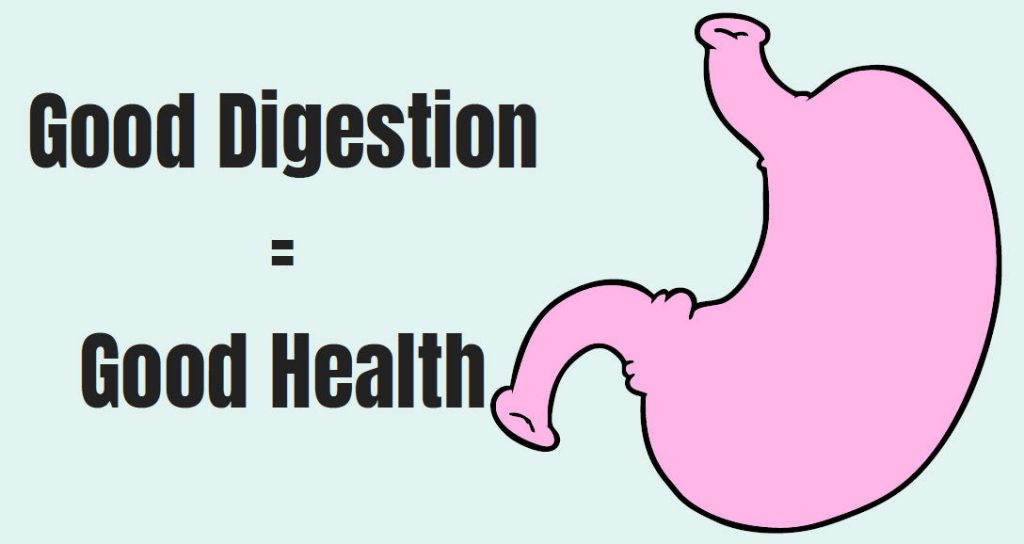
When you understand the digestive process and learn helpful tips to keep it healthy, you will be able to diagnose and treat your own digestive issues. Having a healthy digestive system is imperative to good health; in fact, it’s the foundation of good health.
- The digestive system consists of hormones, nerves, blood, and bacteria. They all work together to do an intricate job of digesting all the liquids and foods you consumed on a daily basis. The digestive system also interacts with all the other systems of the body.
- There are digestive juices with enzymes that speed up chemical reactions in your body. These enzymes breaking down the food you eat into nutrients.
- Cells in the lining of your stomach and small intestine release and produce hormones. These stimulate your digestive juices and regulate your appetite.
- The digestive system is controlled by nerves. These nerves connect digestive organs to the spinal cord and the brain. They release chemicals that contract or relax your muscles. There are also nerves in the GI tract that get triggered when food is present. This enables the digestive system to function properly.
How To Improve Digestive Health
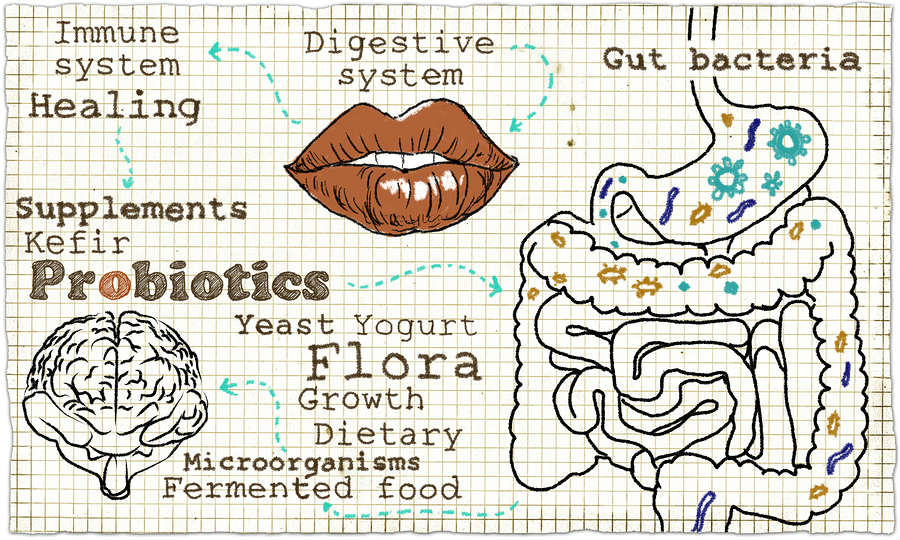
You cannot afford to let your digestive system become ill.
Here is how to improve digestive health:
- Chew your food well before swallowing – Chewing is imperative for proper digestion. This is because the more you break the food down in your mouth, the less work the digestion system has to deal with. Your brain also needs time to get the message that your stomach is full – rather allow your stomach to prepare for the food that it is going to receive.
- Always sit to eat, and eat in a settled environment without the television on.
- Don't overeat – When you eat more than you need, your digestive system cannot digest properly. This will lead to gas, bloating, and discomfort. Leave one-third to one-quarter of your stomach empty to allow space to easily digest the food.
- Fiber, fiber, and more fiber keep the food moving easily through your intestines. Soluble fibers such as whole grains and veggies absorb water and prevent stools from being too watery. Insoluble fibers help by adding bulk to your stools. Fiber also helps to break down any fatty foods you have eaten.
- Drink plenty of water – because water helps to dissolve the soluble fiber, allowing food to easily pass through the intestines. When you have too little water, you have harder stools which make it more difficult to pass through your colon.
- Avoid cold drinks at meals – Drinking iced water with food is like putting cold water on burning logs. It extinguishes the digestive fire which can cause indigestion.
- Eat your main meal at mid-day – Our bodies follow the rhythms of nature. Just like the sun is highest and hottest between 10 am and 2 pm, so too is your digestive fire. Aim to eat 75% of your food before the sun sets each day.
- Get moving – Exercise also moves food easily through the digestive system and increases the flow of blood to all your organs. Exercises tone the wall of the colon to reduce anxiety and stress which plays havoc with your digestive system. How many people have IBS – irritable bowel syndrome? What about ulcers? – All stress-related. Getting enough sleep is important too.
- Eating warm foods is being friendly to your spleen. The spleen does not like the cold. The digestive enzymes also break down foods properly that are warm. It is the cold foods and drinks that can cause the spleen not to work properly. Soups and warm teas and cooked vegetables are great. Always, avoid iced beverages with your meals because they slow your digestion and can create toxic waste.
- Give up smoking because smoking can not only impair your digestive system but your health altogether. Smoking weakens your lungs. Nicotine relaxes the muscles at the lower esophagus which keeps acid in the stomach. When the muscles are relaxed, you experience acid reflux and heartburn. This puts you at risk for gastrointestinal cancer.
- Cut down on alcohol – Sometimes when you drink a lot, your digestion gets out of sorts because acid secretion and the absorption of nutrients in your body is affected. Heartburn, diarrhea, and liver problems are common when the consumption of alcohol is unreasonable.
- Start to lose weight because even a few pounds over your ideal weight can affect your digestion. It can affect the valve situated between your stomach and esophagus which won’t close properly. When you lose weight, you ease the pressure so that your digestive system can continue to work properly.
- Taking probiotics and fiber are a couple of things that the Western diet lacks. The body has good bacteria and bad bacteria and maintaining the right balance is essential to your health. Probiotics are good bacteria; easing IBS and preventing infections and allergies.
- Digestive herbs have a very important and unique purpose in the digestion and detoxification of your body. Here are 7 Top Herbs for digestive health
- Eat mindfully – Sometimes we eat too much too, especially if we are not paying attention. This can lead to gas, bloating, and indigestion. Eating slower and taking notice of what you are putting into your system can reduce symptoms of IBS and even ulcerative colitis. To eat mindfully, eat slower. Focus on what you’re eating, away from television and phones. Notice how your food tastes and how it smells – simply enjoy your food, taking notice of everything about it.
Food Types that Your Digestive System Loves

- Apple cider vinegar
- Raw honey
- Ghee
- Kefir
- Plants like chlorella, spirulina, blue-green algae, seaweed
- Kim Chi which is a fermented type cabbage, a very popular Korean dish
- Sauerkraut
- Tempeh, made from fermented soybeans
- mung beans
- Organic coconut yogurt with no added sugar
Want To Help Your Digestion and Strengthen It?
- Cleanse and detoxify your liver
- Choose to eat smaller meals more often
- Limit your meat and dairy products
- Try and avoid eating grains, protein, and starch veggies all on the same plate of food
- Cut back on pasta and bread
- Eat plenty of fermented foods
- Drink probiotic beverages which contain active and live cultures
- Glutamine is an excellent amino acid that really supports good gut health, helping a leaky gut
- Zinc is a very useful mineral, in fact, critical for ensuring your gut stays healthy. A deficiency can lead to gastrointestinal disorders. Zinc treats diarrhea, leaky gut, colitis, leaky gut, and other digestive problems
- Use digestive herbs like ginger, fennel, coriander, cumin, and cardamom
Promote Good Bacteria
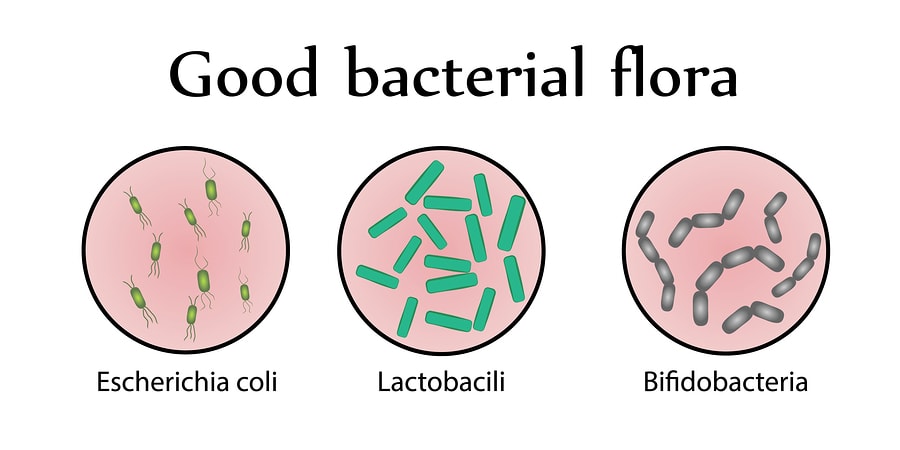
Good bacteria will fight off the infection but it is your responsibility to look after your digestive health. Scientists continue to study both the good and the bad effects of bacteria in the digestive system. Doctors have started using good bacteria to treat life-threatening infections like Clostridium difficile (C diff) infection. It is the long-term use of antibiotics that can even lead to C. diff; severe colon inflammation.
The gut is like your second brain, very sophisticated, and affecting us all in a big way. When inflamed, you will know all about indigestion, bloating and pain which over time can become serious.
There are fantastic mucilaginous herbs and foods such as Slippery elm, Marshmallow root, Chia seeds, Fenugreek seeds and Licorice root which support the healthy mucous lining of your digestive system.
A wonderful formulation I use and recommend is Dr. John Douillard's Slippery Elm Prebiotic Formula. It can heal a world of digestion symptoms and restore a healthy microbiome.
If your digestion is not working thoroughly, then toxic waste will certainly build up and health symptoms will follow.
Did you also know that a healthy liver is the FOUNDATION of great digestion?
Diet, stress, and toxins can make or break liver function. When you have poor liver function, you will also have poor digestion. Consider these points:
- Your liver produces bile and bile breaks down fats. Without bile, you would not be able to digest anything with fat.
- Bile also neutralizes the acids from your stomach and without it, stomach acids would stay in the stomach longer and cause indigestion and heartburn. It also controls the consistency of your stool and without it, you may be constipated for weeks.
- Your liver regulates blood sugar levels along with the pancreas. If your liver is congested, it may discharge excess sugar into your blood and raise your blood sugar.
You may already know that the liver is the housecleaner of your body. Your health depends on how well your liver cleanses toxins. And with so many environmental toxins, processed foods, and body care products, most people would benefit greatly from a liver cleanse.
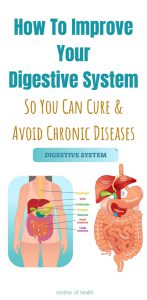

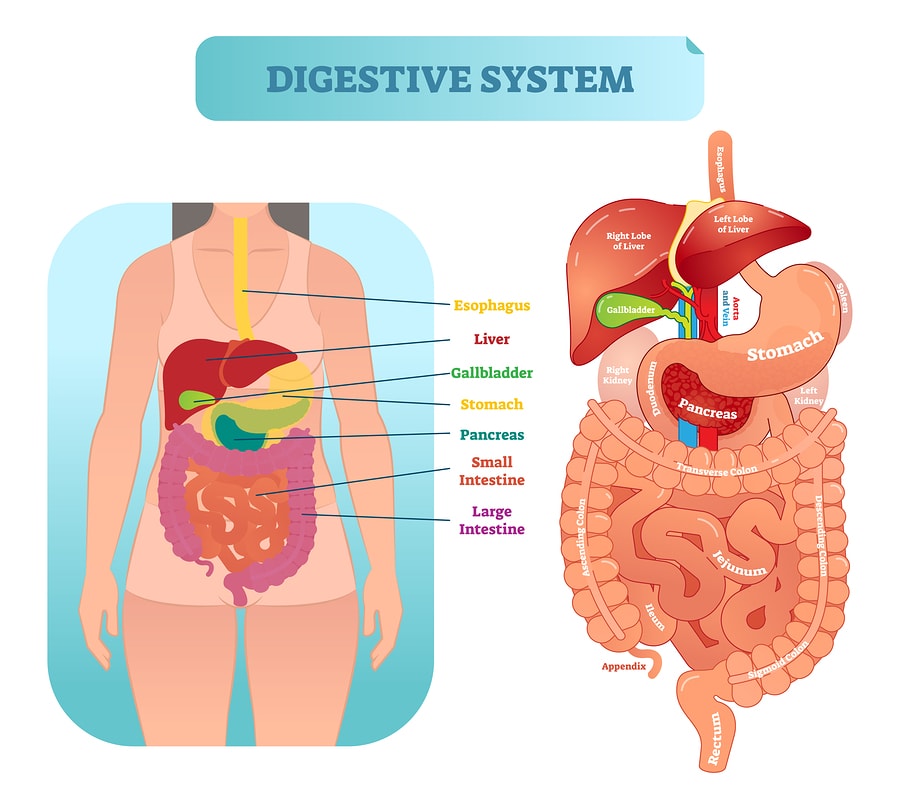

Hi Jackie ,first let me say,great article.Everybody needs to hear this stuff.I like the blog for the following reasons:
1.Great,simple layout and easy to read.
2. loved the section on wheat.Great info here.I try to stay away from wheat as much as possible.
3.So good to have an in depth explanantion of the digestive system and its parts and functions.
4. Great images used showing the digestive system.
It simply just makes sense that it all starts here with gut health because that is where the “input” to our body starts.Great work and good article Jackie :))
Hey Billy, Happy it helped you and thanks so much for the feedback. Take care, Jackie
Anything that has to do with the digestive system, always catches my attention. For a long time, I thought it was an embarrassing topic.But within time, I have come to notice that this is so common. Thanks to posts like these, I have been able to speak about it publicly.
I’m happy you found it useful, Linda. Thanks for taking the time to share. Be well, 🙂 xo